What are the real benefits of recycling?
You may have heard the phrase ‘Reduce, Reuse, Recycle’ and this is a key term associated with recycling that is used all over the globe. It refers to how we should be living more sustainably and how we can be more environmentally friendly in our everyday lives.
But that still leaves us with the question: Why should we recycle? There are so many benefits of recycling and in this blog, we are going to explore some of the most important benefits that recycling has on our environment.
Reduce the amount of waste going to landfill
Every day our population continues to grow and more and more waste is being produced and going to landfill which is causing a huge strain on our environment. This leads to an increased risk of pollution, poisoning and potential health problems. By continuing to recycle, little by little we can reduce the amount of waste going to landfill, as well as reduce the amount of space required for landfill sites.
Recycling creates more jobs
The recycling industry is huge and is much more labour intensive than solid waste management. In fact, Friends of the Earth said that if 70% of collected waste was recycled, it could create over 51,000 recycling jobs in the UK. Recycling is an integrated process that requires thousands of workers to sort and ship it to the right places.
Protecting wildlife
Sadly, it’s predicted that a truckload of plastic waste is poured into our oceans every minute which has detrimental effects. Not only can it take up to 200 years to decompose, it poses a huge threat to marine life and is also dangerous to birds who often mistake them as food.
Recycling reduces the need to extract new raw materials from the Earth which helps to reduce and prevent further damage being done to natural wildlife. For example, fewer forests being cut down which can harm wildlife in the process, fewer rivers being diverted and less air and water pollution.
Cheaper than waste collection
To put it simply, the more we recycle, the more money we save. In 2017, Lambeth council said that “it is six times cheaper to dispose of recycled waste than general refuse”. By recycling, we can put all the money that we save towards other vital elements within our economy such as households, business and public services. Recycling your food waste is also very beneficial as often it can be reused to generate compost for growing more food or crops.
Bring the community together
Whilst each and every one of us has a part to play in recycling, ultimately it should be a community effort. Whether you’re collecting materials for schools or picking up trash on the road, there are many ways that we, as a community, can work together to make recycling a much more enjoyable and easier process.
Most councils have now set up ‘recycling centres’ which make it easy as ever for the local community to recycle and most council websites also have free downloads to show you exactly what we can and can’t recycle and where it should go.
As we want recycling to become a part of our everyday life, this is also a great way to teach children about responsibility and taking a stance to help protect their environment.
As we’ve seen above, recycling is very important as waste has a huge negative impact on our natural environment. Not only does recycling help to reduce the pollution caused by waste, it reduces the need for raw materials so that our wildlife can be protected. As important as it is to recycle, we also need to focus on reducing the amount of plastic that we are using the first place.
At Quills, we are working hard to continue on our environmental journey and love to help our customers purchase more sustainably and reach their CSR targets. Why not be part of our journey and make a bigger impact? Get in touch today to see how we can help you become a greener business.






